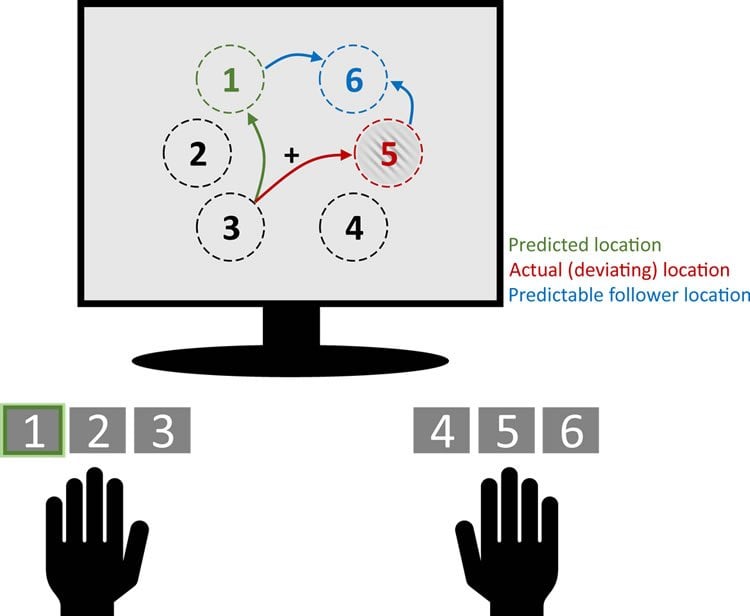Summary: A new study reports sleeps help improve learning performance in predictable processes.
Source: University of Tübingen.
Sleep stabilizes previously gained knowledge and, by doing so, helps to develop long-term memory. In a new study, Tübingen researchers Nicolas Lutz, Ines Wolf and Stefanie Hübner investigated whether sleep also improves learning performance in predictable processes. Their research was supervised by Professor Jan Born and Dr. Karsten Rauss of the University of Tübingen’s Institute of Medical Psychology and Behavioral Neurobiology.
In their experiment, the researchers asked two groups of test persons to learn certain sequences of visual patterns on a computer screen. Following a period of either sleep or being awake, the researchers tested their subjects to find out how they responded to changes in the sequences they had learned. It turned out that the group which had slept had more strongly internalized the sequences and dealt with them more confidently, even when the sequences were presented more quickly. The study has been published in the latest Journal of Neuroscience.
Researchers have a lot of evidence indicating that our brain stores the rules and principles of predictable processes. “To date we knew little about how predictions arising from previously acquired knowledge were generated and maintained over longer periods,” first author Nicolas Lutz says. In the current study, the team investigated whether sleep contributed to the formation, stabilization and abstraction of internal models of simple tasks. Tests subjects had to press a numbered button corresponding with the position of the pattern on the screen. One-off changes were introduced to previously-learned sequences. The researchers assessed the rate of button-pressing mistakes following a deviant stimulus and the stimulus directly following.
More mistakes prove better learning performance
“The error rate for deviant stimuli was much higher in the group which had slept than in the group which stayed awake,” Lutz says. “One of the reasons for this was that the subjects, after sleep, more frequently pressed the button for the expected stimulus instead of the one actually presented,” he adds. This is evidence that the group which slept had better internalized the original sequences and was therefore better able to predict them than the group which had remained awake, he says. The rested subjects were also quicker to get back into the original sequence when it returned after a divergent stimulus, according to Lutz.

Tasks comprising sequences in time and space are ubiquitous in our everyday lives. “When driving or playing a team sport, it is immensely important to anticipate the movement of the other parties and of objects. It is the only way that we can react adequately to unpredictable events, especially at high speed,” says project leader Karsten Rauss. “In follow-up studies we will try to find out how sleep contributes to the generation and storage of this kind of prediction on the neural level.”
Nicolas Lutz adds: “The formation of internal models which represent regularities in our environment and store them accordingly makes it easier for us to register unexpected events and to learn from them.” He says the new study has shown that sleep has a positive effect on this very useful learning process. “Our environment is constantly changing. In order to quickly adapt our behavior, we need efficient internal models that reflect complex patterns and, at the same time, simplify the countless stimuli flooding our senses.”
Source: University of Tübingen
Publisher: Organized by NeuroscienceNews.com.
Image Source: NeuroscienceNews.com image is credited to Nicolas Lutz.
Original Research: Abstract for “Sleep Strengthens Predictive Sequence Coding” by Nicolas D. Lutz, Ines Wolf, Stefanie Hübner, Jan Born and Karsten Rauss in Journal of Neuroscience. Published October 17 2018.
doi:10.1523/JNEUROSCI.1352-18.2018
[cbtabs][cbtab title=”MLA”]University of Tübingen”Sleep Helps Us Predict Regular Sequences of Events.” NeuroscienceNews. NeuroscienceNews, 18 October 2018.
<https://neurosciencenews.com/sleep-event-sequencing-10056/>.[/cbtab][cbtab title=”APA”]University of Tübingen(2018, October 18). Sleep Helps Us Predict Regular Sequences of Events. NeuroscienceNews. Retrieved October 18, 2018 from https://neurosciencenews.com/sleep-event-sequencing-10056/[/cbtab][cbtab title=”Chicago”]University of Tübingen”Sleep Helps Us Predict Regular Sequences of Events.” https://neurosciencenews.com/sleep-event-sequencing-10056/ (accessed October 18, 2018).[/cbtab][/cbtabs]
Abstract
Sleep Strengthens Predictive Sequence Codingm
Predictive-coding theories assume that perception and action are based on internal models derived from previous experience. Such internal models require selection and consolidation to be stored over time. Sleep is known to support memory consolidation. We hypothesized that sleep supports both consolidation and abstraction of an internal task model that is subsequently used to predict upcoming stimuli. Human subjects (of either sex) were trained on deterministic visual sequences and tested with interleaved deviant stimuli after retention intervals of sleep or wakefulness. Adopting a predictive-coding approach, we found increased prediction strength after sleep, as expressed by increased error rates to deviant stimuli, but fewer errors for the immediately following standard stimuli. Sleep likewise enhanced the formation of an abstract sequence model, independent of the temporal context during training. Moreover, sleep increased confidence for sequence knowledge, reflecting enhanced metacognitive access to the model. Our results suggest that sleep supports the formation of internal models which can be used to predict upcoming events in different contexts.
SIGNIFICANCE STATEMENT
To efficiently interact with the ever-changing world, we predict upcoming events based on similar previous experiences. Sleep is known to benefit memory consolidation. However, it is not clear whether sleep specifically supports the transformation of past experience into predictions of future events. Here, we find that, when human subjects sleep after learning a sequence of predictable visual events, they make better predictions about upcoming events compared with subjects who stayed awake for an equivalent period of time. In addition, sleep supports the transfer of such knowledge between different temporal contexts (i.e., when sequences unfold at different speeds). Thus, sleep supports perception and action by enhancing the predictive utility of previous experiences.






